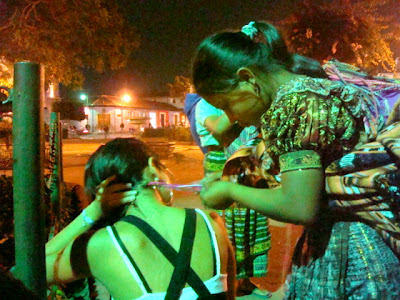Our last night in Antigua, as we sat peacefully on a bench, we suddenly got caught in the middle of a crowd of adolescent girls! Some native Guatemalan girls, dressed in traditional clothing and carrying big loads of materials on their backs, were offering to give hair wraps to a family with several teenage daughters. Hair wraps, if you don't know, are just small sections of hair that have been wrapped in colorful thread, and are many times a 'souvenir' for tourists to take back home.
I watched as the seemingly wealthy, Latin teenagers asked their parents for the cash, then picked out their favorite colors of thread and fancy beads. And then I watched the skillful young hands of the native girls as they wrapped their customers' hair. Being in a different culture helps me see things in new, and many times clearer, ways, and that night as I observed the native girls - working at 9pm to earn a couple bucks - and the wealthy Latin girls - enjoying all the thrills of their family vacation - I wondered, 'Why is one girl born into poverty, and thus destined to work and struggle in a difficult life, while another girl is born into wealth, with access to opportunity and all she may need or desire?'
And then, of course, I thought about my own life...Why was I born in Edmond, Oklahoma, USA, and not into the slums of some of the poorest nations in the world? What makes me different... 'the lucky one?' And now that I have been born and raised in one of the richest nations of the world, what do I do with that? Many short term mission groups are visiting Honduras right now, especially because it's summertime, and I know that members of those groups often ask themselves similar questions.
One of my favorite authors, Henri Nouwen, wrote Gracias, which is actually a journal of his time living and serving in South America. He was daily faced with issues of wealth and poverty, and I love some of the perspectives he shares. He explains how, because of the many "safety systems" in his life, he would not be allowed to become truly poor. I believe the same is true for Bart and me, too, as we live here in Honduras. He says,
I am not poor as my neighbors are. I will never be and will not ever be allowed to be by the people who sent me here. I have to accept my own history and live out my vocation, without denying that history. On the other hand, I realize that the way of Christ is a self-emptying way. What that precisely means in my own concrete life will probably remain a lifelong question.For me, the key words are 'self-emptying' and 'lifelong.' When we empty self, we strive for ways of being and living that are sacrificial, focused on the good of others. We ask ourselves, 'Okay, I'm giving this much of my time/energy/resources, but can I give more?' And when we acknowledge that this is a lifelong question, a lifelong process, we're saying that a regular, honest examination of our lifestyle and future goals will have to occur for the rest of our time here on earth.
My favorite part of the book - which the title alludes to - is that none of what we do is to be out of guilt, but out of gratitude. We can joyfully live each day in the service of others, completely out of gratitude for what Christ has done for us! So inspiring!
md





